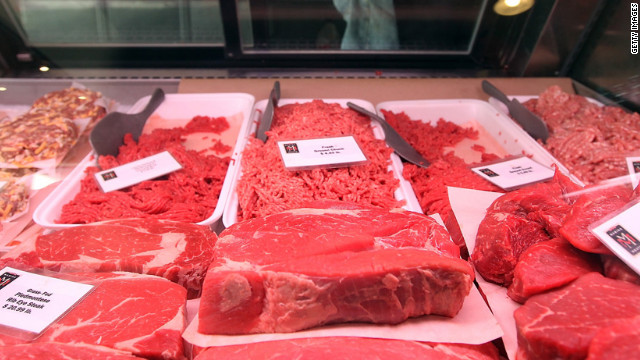By
Anne Harding, Health.com
Updated 5:06 PM EDT, Mon March 12, 2012

In addition, a diet rich in red meat is likely to come up short in other areas, says Robert Ostfeld, M.D.
Want to live longer? Trade some of the red meat in your diet for fish, nuts, whole grains, and other healthier protein sources, Harvard researchers say.
That's the conclusion of a new study, published this week in the Archives of Internal Medicine, that found that the risk of dying at an early age -- from heart disease, cancer, or any other causeórises in step with red-meat consumption.
Eating too much red meat, which is high in saturated fat and cholesterol, has long been seen as unhealthy, especially for the heart. The new study, however, is the first to estimate the effect of swapping out red meat on a person's lifespan.
Using data from two long-running studies of health professionals, researchers tracked the diets of more than 121,000 middle-aged men and women for up to 28 years. Roughly 20% of the participants died during that period.
On average, each additional serving of red meat the participants ate per day was associated with a 13% higher risk of dying during the study. Processed red meat products -- such as hot dogs, bacon, and salami -- appeared to be even more dangerous: Each additional daily serving was associated with a 20% higher risk of dying.
Based on these findings, the researchers estimate that substituting one daily serving of red meat with fish, poultry, nuts, legumes, whole grains, or low-fat dairy products would reduce the risk of dying in this stage of life by 7% to 19%. If everyone in the study had slashed their average red-meat intake to less than half a serving per day, the researchers say, 9% of deaths among men and 8% of deaths among women could have been prevented.
"Our message is to try to reduce the red meat consumption to less than two to three servings per week," says lead author An Pan, Ph.D., a research fellow at the Harvard School of Public Health, in Boston. "We don't want everyone to be a vegetarian," Pan says, though he adds that avoiding processed red meat altogether may be a good idea. "It's better to go with unprocessed products and plant-based foods."
Dean Ornish, M.D., the founder and president of the Preventive Medicine Research Institute, in Sausalito, California, says a plant-based diet provides a "double benefit" in that it reduces a person's exposure to the harmful substances in meat while also providing valuable nutrients. "There are literally hundreds of thousands of protective substances that you find in fruits and vegetables and whole grains and legumes and soy products that prevent disease," says Ornish, who wrote an editorial accompanying the study.
Why is red meat, and especially processed red meat, potentially harmful? In addition to the high saturated fat content, which can contribute to heart disease, charring red meat at high temperatures can produce carcinogens on the surface, Pan says. And processed meats contain certain additives that in high quantities are believed to promote cancer as well.
In addition, a diet rich in red meat is likely to come up short in other areas, says Robert Ostfeld, M.D., a cardiologist and associate professor of clinical medicine at Montefiore Medical Center, in the Bronx, N.Y. "If you eat more red meat, on average, you may be eating fewer fruits and vegetables, so you're getting the bad things from the red meat and you're not getting the good things from the fruits and vegetables," says Ostfeld, who did not participate in the study. "My preference is for people to have as little red meat as they can, and I think it's ideal to avoid red meat."
Staffan Lindeberg, M.D., an associate professor of medicine at the University of Lund, in Sweden, says singling out red meat may be counterproductive. A bigger threat to health is the sugar- and starch-heavy Western diet as a whole, says Lund, who studies heart disease and diabetes and advocates a version of the so-called Paleolithic diet, which emphasizes lean meats, fruits, and vegetables.
"We need to focus more on common foods, like grains, dairy foods, refined fats, and refined sugar," Lindeberg says.
Studies like Pan's are inherently iffy due to red meat's unhealthy reputation, which makes red-meat consumption difficult to tease apart from a person's overall lifestyle, Lindeberg says. "Red meat has been perceived as a villain for many years, and people who avoid red meat take all sorts of precautionary measures for their future health," he says. "It is not possible to statistically adjust for all of these measures."
Sure enough, Pan and his colleagues found that the men and women in the study who ate the most red meat also tended to be heavier, less physically active, and more likely to smoke and drink alcohol than their peers. However, the researchers did take those and other factors into account in their analysis.














 Linear Mode
Linear Mode






